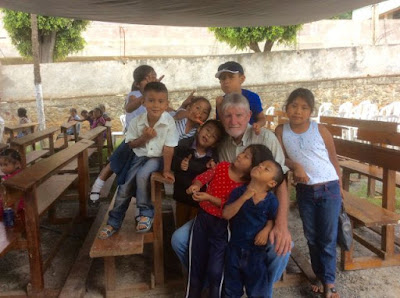This
is the essence of the spiritual path of devotional service. One enters into the
helping act not only because there is a need to be met. Service gradually
becomes an offering, first to those we are with, but eventually to that greater
truth or source of being in which we are all joined in love. Helping becomes an
act of reverence, worship, gratitude. It is grace merely to have the chance to
serve.
- Ram Dass and Paul Gorman, How
Can I Help?
“It is grace merely to have the chance to
serve.” Mission Mexico has been
experiencing that grace for many years, and as 2016 draws to a close, a lot of “special
graces” seemed to come together.
 |
| This is Monica, who has never owned a pair of shoes...hopefully that will change in 2017 |
I visited Flora the other day in her village of
Agua Tordillo. After living forty-one years seeing only “shadows” (in Flora’s
words) or only “silhouettes” (in the doctor’s words), Flora can now see
clearly, thanks to the MAS Clinic and Mission Mexico. What most impacted me
about visiting with Flora (besides the evident joy she now experiences) was the
new “cleanliness” in her life. Her clothes were clean; her house was clean; her
kids were clean; the yard around her house was clean. Flora is a new woman!
 |
| To call Flora "radiant" now that she can see is no exaggeration |
I visited with Braulio, who also received
medical care at the MAS Clinic thanks to Mission Mexico. The liveliness in
Braulio’s eyes and the energy he displays witness to the fact that this malnourished
child is well on the road to recovery. He has left his village only once in his
life, but he says he wants to leave again. When I asked him why, he responded
with one word: “Chicken.” So I guess he enjoyed his one and only visit to a
restaurant.
 |
| Braulio is one happy camper after receiving medical care |
I visited a junior high school in the
isolated village of Calpanapa Viejo (two hours on pavement, four hours on dirt
road). They don’t have official “teachers,” but two high school graduates (Marcos
and Jorge) are helping them learn. When I asked the twenty-six students if
there was anything they needed, almost all responded, “Notebooks.” Hopefully Mission Mexico will be able to fulfill
that wish for them early in 2017.
 |
| The junior high students and their two "teachers" in their "classroom" in Calpanapa Viejo |
I visited the Champagnat High School of the
Mountain, where 249 indigenous students from impoverished families in more than
35 villages where there is no high school are presently studying. The motto of the school, directed by
the Marist Brothers, is “To Live Is to Serve.” The most common word one hears
in the mouth of these students is “dream”: they all have the dream of educating
themselves to be of service to their families and their communities. Mission Mexico helped to build the
school in 2004, and it continues to support the maintenance of the school.
 |
| This year's group of students and teachers at the Champagnat High School of the Mountain: thank you, Mission Mexico |
And on Sunday, the people of Tlapa were pleased
that Edgar Peralta Silva came from Mexico City to share in the Sunday Eucharist
with his friends at the local cathedral. Twenty-three-year-old Edgar suffered a
bad fall in late April, and he is still paralyzed from the waist down. Doctors
at the National Rehabilitation Institute have scheduled surgery on his spinal
column for December 15. Mission Mexico
wishes Edgar all the best in this delicate operation. Edgar says that he is "anxious but not scared."
 |
| Edgar at the Cathedral of Tlapa; surgery is scheduled for December 15 (hint: prayers) |
I could go on and on about the “helping acts”
that Mission Mexico is involved in
here in the mountains of Mexico, but I hope that these examples are enough to
let the reader know that Mission Mexico
is making a difference in very many lives. I write this on Friday, December 9; in
the Diocese of Calgary a collection will be taking place in churches this coming weekend for Mission Mexico. I know
that times are challenging in Alberta, but I hope that people will
be generous and that they can identify with the words included at the beginning
of this note: Service gradually becomes
an offering, first to those we are with, but eventually to that greater truth
or source of being in which we are all joined in love. Helping becomes an act
of reverence, worship, gratitude. It is grace merely to have the chance to
serve. Thank you for your solidarity.
 |
| Thousands of people from hundreds of villages in the mountains will be doing a relay run this weekend with a torch lit at the Shrine of Guadalupe in Mexico City (I will be one of those thousands) |












































